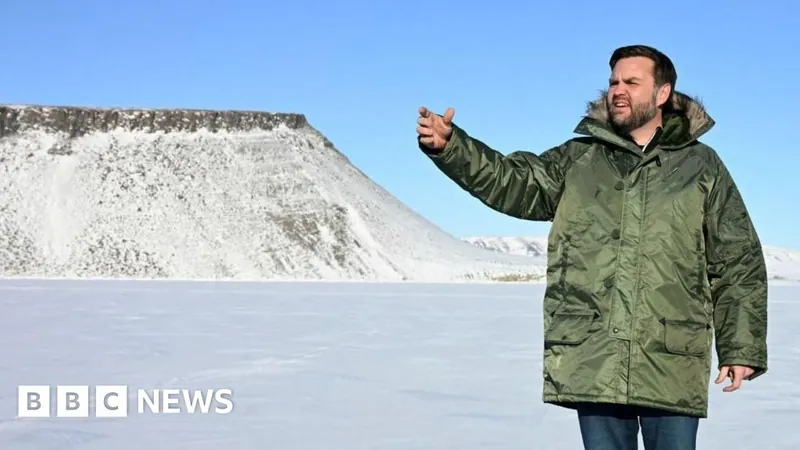
JD Vance Delivers Stark Warning in Greenland: A Call to Action Against Evolving Threats
2025-03-29
Author: Emma
JD Vance Delivers Stark Warning in Greenland: A Call to Action Against Evolving Threats
In the dramatic backdrop of the northern lights dancing overhead, U.S. Vice President JD Vance made a controversial visit to Greenland's Pituffik military base, shedding light on significant geopolitical shifts and alarming challenges facing the vast, ice-covered territory.
His remarks echoed a forceful acknowledgment: powerful nations, particularly China, are eyeing Greenland's vast resources and strategic position. With the Arctic becoming an arena of intense competition, Vance's underlying message was clear: Greenland must abandon its perceived ‘weak’ ties to Denmark and seek stronger support from the United States.
"We cannot ignore the encroachment of powerful countries as they expand their ambitions," Vance declared to U.S. troops. This stark warning emphasized the urgency for Greenland to recognize the new realities of global politics, where a militarily assertive China is increasingly influential in Arctic affairs.
While Vance sought to present a reassuring front, aiming to diminish fears of American military action, his rhetoric undoubtedly raised eyebrows. He hinted at a growing disenchantment with long-held European alliances, suggesting that Greenland’s aspirations for autonomy needed to be met with a shift toward U.S. partnership.
Danish Prime Minister Mette Frederiksen responded strongly to Vance's remarks, condemning them as unjustifiable and reminiscent of threats – a sentiment highlighted by local residents who recently celebrated the establishment of a new coalition government in Nuuk. The atmosphere was one of pride and unity as the predominantly Inuit population expressed their commitment to cultural preservation and self-determination, with just 6% of Greenlanders favoring any form of U.S. governance.
Greenland's journey toward independence is a cautious and complex one. As its new government begins negotiations with both Copenhagen and Washington, there is a palpable desire to evolve economically while guarding against exploitation by foreign powers. The ambitions for full independence will take time, grounded in the realization that economic growth is essential for any sustainable self-governance.
Despite the anxiety surrounding U.S. intentions, Vance reassured that the U.S. respects Greenlanders' sovereignty, stating that their self-determination is paramount. This contrasts with the more aggressive messaging from the Trump administration, leading to confusion among the local populace about America's true aims.
The possibility remains that the U.S. could achieve its strategic objectives in Greenland without outright ownership or annexation. The existing military pact allows for increased U.S. military presence, reflecting a historical commitment to Greenland's defense, akin to Cold War-era dynamics.
However, the U.S. approach under Trump has often been seen as bullying, leading to tensions that culminated in the cancelation of a planned cultural tour by Vance’s wife after local protests. Many in Nuuk advocate for a gentler, more nuanced engagement that respects Greenland’s autonomy and fosters cooperative relations.
As Greenland grapples with its identity on the world stage, balancing independence aspirations and the realities of global politics, the calls from Washington signal a pivotal moment in its history – one that could redefine its future in a rapidly changing Arctic landscape.









 Brasil (PT)
Brasil (PT)
 Canada (EN)
Canada (EN)
 Chile (ES)
Chile (ES)
 Česko (CS)
Česko (CS)
 대한민국 (KO)
대한민국 (KO)
 España (ES)
España (ES)
 France (FR)
France (FR)
 Hong Kong (EN)
Hong Kong (EN)
 Italia (IT)
Italia (IT)
 日本 (JA)
日本 (JA)
 Magyarország (HU)
Magyarország (HU)
 Norge (NO)
Norge (NO)
 Polska (PL)
Polska (PL)
 Schweiz (DE)
Schweiz (DE)
 Singapore (EN)
Singapore (EN)
 Sverige (SV)
Sverige (SV)
 Suomi (FI)
Suomi (FI)
 Türkiye (TR)
Türkiye (TR)
 الإمارات العربية المتحدة (AR)
الإمارات العربية المتحدة (AR)